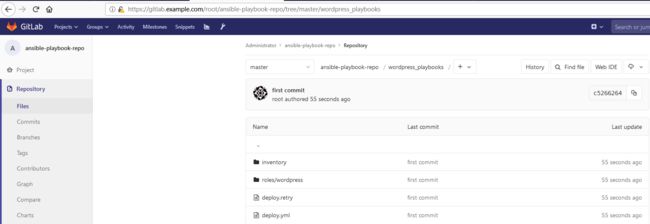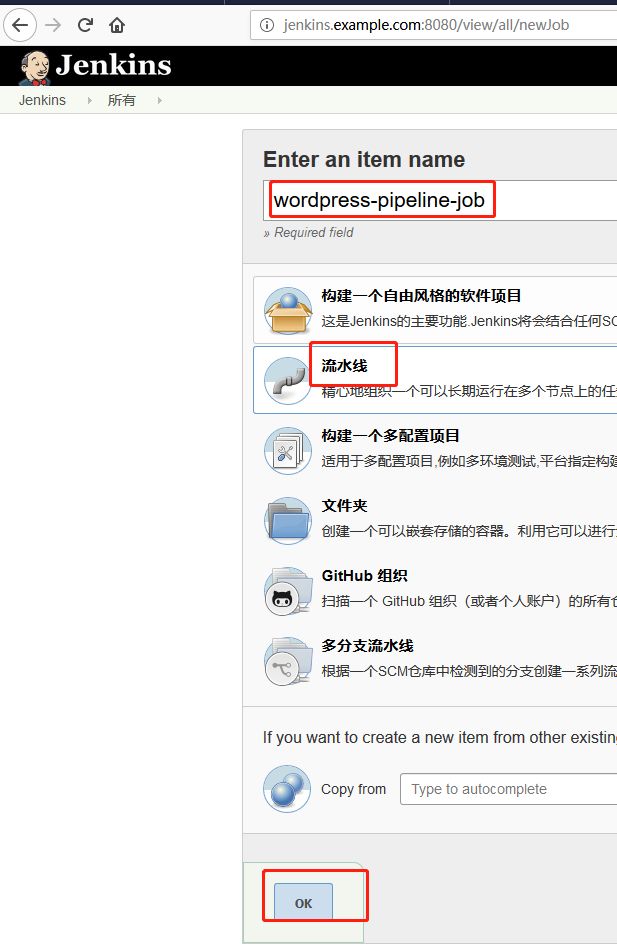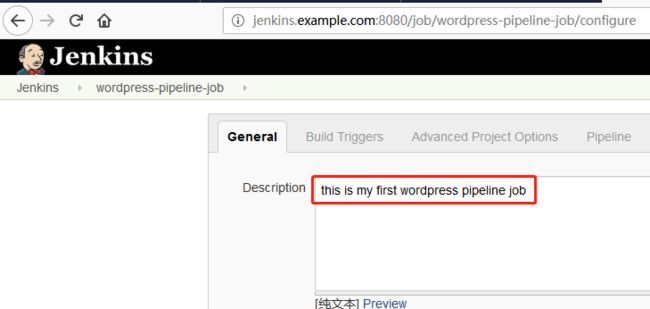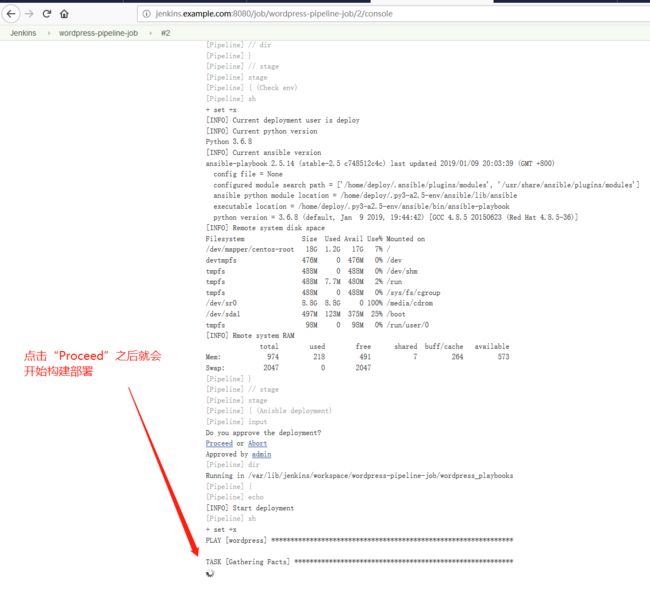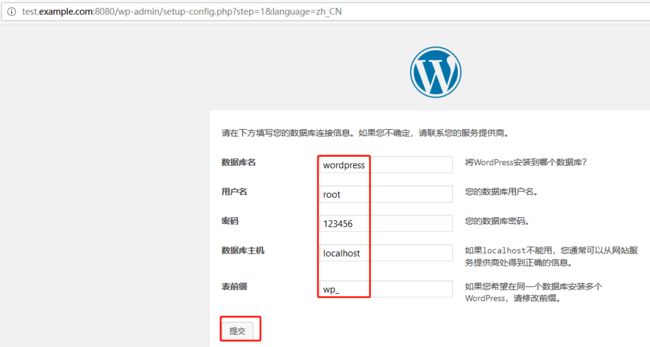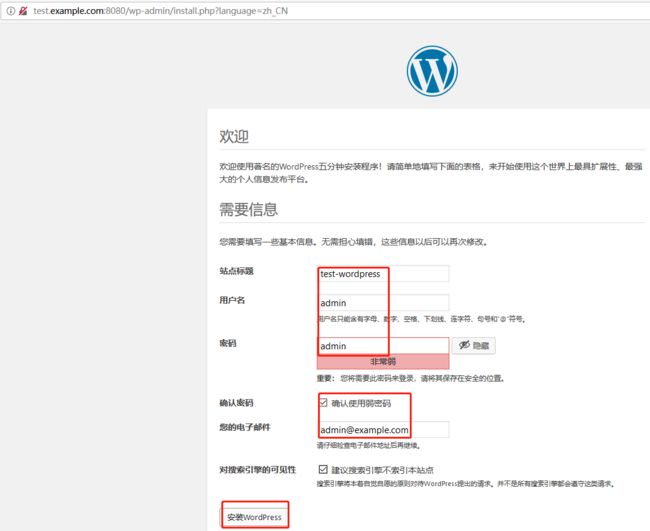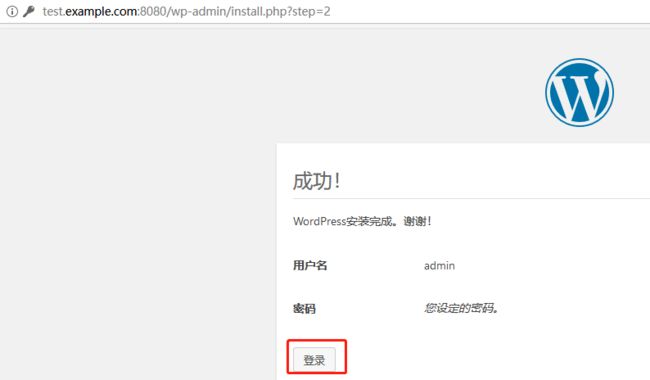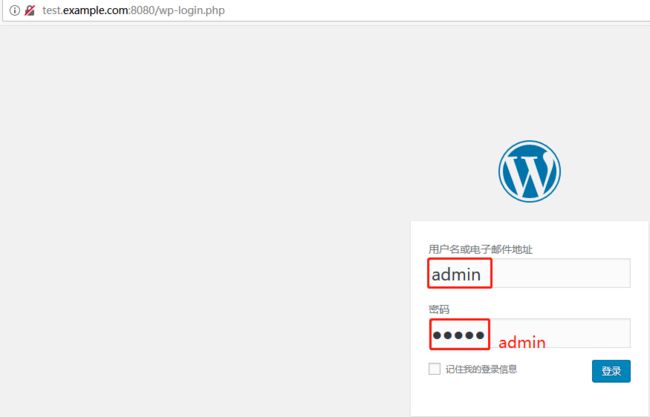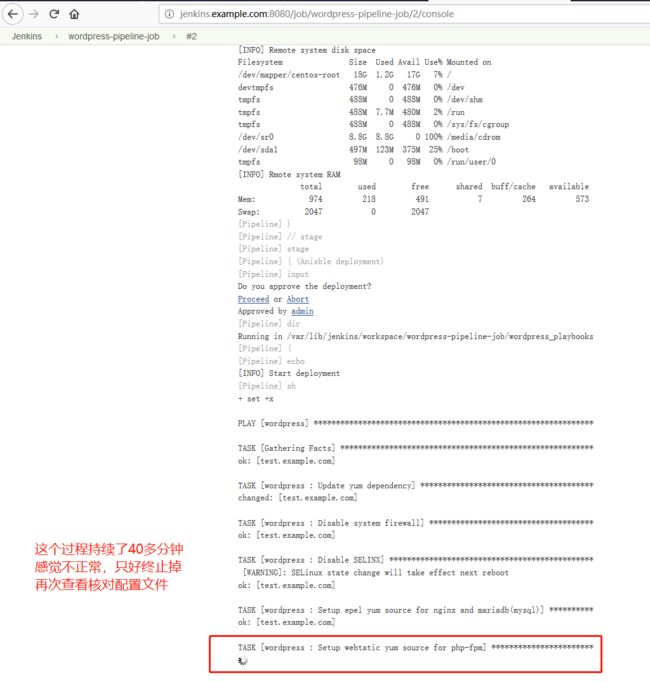Jenkins+Gitlab+Ansible自动化部署(六)
Pipeline Job实现Nginix+MySQL+PHP+Wordpress实现自动化部署交付(Jenkins+Gitlab+Ansible自动化部署(五)https://www.cnblogs.com/zd520pyx1314/p/10249094.html)
- 环境准备
- 编写ansible playbook脚本实现Wordpress远程部署
- 将wordpress源码与playbook部署脚本提交到gitlab仓库
- 编写pipeline job脚本实现Jenkins流水线持续交付流程
- Jenkins集成Ansible与gitlab实现wordpress的自动化部署
验证环境
登录Jenkins主机
xueji@xueji MINGW64 ~ $ ssh [email protected] Last login: Thu Jan 10 11:41:49 2019 from 192.168.244.1 [root@jenkins ~]# su - deploy Last login: Wed Jan 9 20:24:43 CST 2019 on pts/0 [deploy@jenkins ~]$ source /home/deploy/.py3-a2.5-env/bin/activate (.py3-a2.5-env) [deploy@jenkins ~]$ source /home/deploy/.py3-a2.5-env/ansible/hacking/env-setup -q (.py3-a2.5-env) [deploy@jenkins ~]$ ansible-playbook --version ansible-playbook 2.5.14 (stable-2.5 c748512c4c) last updated 2019/01/09 20:03:39 (GMT +800) config file = None configured module search path = ['/home/deploy/.ansible/plugins/modules', '/usr/share/ansible/plugins/modules'] ansible python module location = /home/deploy/.py3-a2.5-env/ansible/lib/ansible executable location = /home/deploy/.py3-a2.5-env/ansible/bin/ansible-playbook python version = 3.6.8 (default, Jan 9 2019, 19:44:42) [GCC 4.8.5 20150623 (Red Hat 4.8.5-36)] (.py3-a2.5-env) [deploy@jenkins ~]$ ssh [email protected] Last login: Thu Jan 10 13:04:32 2019 from 192.168.244.131 [root@test ~]# hostname test.example.com
登录Jenkins web管理页
登录gitlab web管理页
至此环境准备完成。
接下来编写ansible playbook脚本实现wordpress远程部署
开始编写配置文件
xueji@xueji MINGW64 ~/Desktop/repo $ cd ~/Desktop/repo/ansible-playbook-repo/ xueji@xueji MINGW64 ~/Desktop/repo/ansible-playbook-repo (master) $ ll total 5 -rw-r--r-- 1 xueji 1049089 0 1月 10 11:57 ansible-playbook.txt drwxr-xr-x 1 xueji 1049089 0 1月 10 12:27 nginx_playbooks/ -rw-r--r-- 1 xueji 1049089 312 7月 15 08:33 nginx-freestyle-job.sh xueji@xueji MINGW64 ~/Desktop/repo/ansible-playbook-repo (master) $ mkdir wordpress_playbooks xueji@xueji MINGW64 ~/Desktop/repo/ansible-playbook-repo (master) $ cd wordpress_playbooks/ xueji@xueji MINGW64 ~/Desktop/repo/ansible-playbook-repo/wordpress_playbooks (master) $ mkdir inventory xueji@xueji MINGW64 ~/Desktop/repo/ansible-playbook-repo/wordpress_playbooks (master) $ mkdir -p roles/wordpress/{files,tasks,templates} xueji@xueji MINGW64 ~/Desktop/repo/ansible-playbook-repo/wordpress_playbooks (master) $ ll total 0 drwxr-xr-x 1 xueji 1049089 0 1月 10 13:29 inventory/ drwxr-xr-x 1 xueji 1049089 0 1月 10 13:30 roles/
配置deploy.retry xueji@xueji MINGW64 ~/Desktop/repo/ansible-playbook-repo/wordpress_playbooks (master) $ vim deploy.retry test.example.com
配置deploy.yml
xueji@xueji MINGW64 ~/Desktop/repo/ansible-playbook-repo/wordpress_playbooks (master) $ vim deploy.yml - hosts: wordpress gather_facts: true remote_user: root vars: backup_to: "{{root}}_{{branch}}_{{ansible_date_time.epoch}}" roles: - wordpress
配置dev
xueji@xueji MINGW64 ~/Desktop/repo/ansible-playbook-repo/wordpress_playbooks (master) $ vim inventory/dev [wordpress] test.example.com [wordpress:vars] server_name=test.example.com port=8080 user=deploy worker_processes=2 max_open_file=30000 root=/data/www gitlab_user='root' gitlab_pass='12345678'
配置prod
xueji@xueji MINGW64 ~/Desktop/repo/ansible-playbook-repo/wordpress_playbooks (master) $ vim inventory/prod [wordpress] test.example.com [wordpress:vars] server_name=test.example.com port=80 user=deploy worker_processes=4 max_open_file=65505 root=/data/www gitlab_user='root' gitlab_pass='12345678'
配置health_check.sh和info.php
xueji@xueji MINGW64 ~/Desktop/repo/ansible-playbook-repo/wordpress_playbooks (master) $ vim roles/wordpress/files/health_check.sh #!/bin/sh URL=$1 PORT=$2 curl -Is http://$URL:$PORT/info.php > /dev/null && echo "The remote side is healthy" || echo "The remote side is failed, please check" xueji@xueji MINGW64 ~/Desktop/repo/ansible-playbook-repo/wordpress_playbooks (master) $ echo "" >> roles/wordpress/files/info.php
配置www.conf
xueji@xueji MINGW64 ~/Desktop/repo/ansible-playbook-repo/wordpress_playbooks (master) $ vim roles/wordpress/files/www.conf ; Start a new pool named 'www'. [www] ; Unix user/group of processes ; Note: The user is mandatory. If the group is not set, the default user's group ; will be used. ; RPM: apache Choosed to be able to access some dir as httpd user = deploy ; RPM: Keep a group allowed to write in log dir. group = deploy ; The address on which to accept FastCGI requests. ; Valid syntaxes are: ; 'ip.add.re.ss:port' - to listen on a TCP socket to a specific IPv4 address on ; a specific port; ; '[ip:6:addr:ess]:port' - to listen on a TCP socket to a specific IPv6 address on ; a specific port; ; 'port' - to listen on a TCP socket to all addresses ; (IPv6 and IPv4-mapped) on a specific port; ; '/path/to/unix/socket' - to listen on a unix socket. ; Note: This value is mandatory. ;listen = 127.0.0.1:9000 listen = /var/run/php-fpm/php-fpm.sock ; Set listen(2) backlog. ; Default Value: 511 (-1 on FreeBSD and OpenBSD) ;listen.backlog = 511 ; Set permissions for unix socket, if one is used. In Linux, read/write ; permissions must be set in order to allow connections from a web server. Many ; BSD-derived systems allow connections regardless of permissions. ; Default Values: user and group are set as the running user ; mode is set to 0660 listen.owner = deploy listen.group = deploy ;listen.mode = 0660 ; When POSIX Access Control Lists are supported you can set them using ; these options, value is a comma separated list of user/group names. ; When set, listen.owner and listen.group are ignored ;listen.acl_users = ;listen.acl_groups = ; List of addresses (IPv4/IPv6) of FastCGI clients which are allowed to connect. ; Equivalent to the FCGI_WEB_SERVER_ADDRS environment variable in the original ; PHP FCGI (5.2.2+). Makes sense only with a tcp listening socket. Each address ; must be separated by a comma. If this value is left blank, connections will be ; accepted from any ip address. ; Default Value: any listen.allowed_clients = 127.0.0.1 ; Specify the nice(2) priority to apply to the pool processes (only if set) ; The value can vary from -19 (highest priority) to 20 (lower priority) ; Note: - It will only work if the FPM master process is launched as root ; - The pool processes will inherit the master process priority ; unless it specified otherwise ; Default Value: no set ; process.priority = -19 ; Choose how the process manager will control the number of child processes. ; Possible Values: ; static - a fixed number (pm.max_children) of child processes; ; dynamic - the number of child processes are set dynamically based on the ; following directives. With this process management, there will be ; always at least 1 children. ; pm.max_children - the maximum number of children that can ; be alive at the same time. ; pm.start_servers - the number of children created on startup. ; pm.min_spare_servers - the minimum number of children in 'idle' ; state (waiting to process). If the number ; of 'idle' processes is less than this ; number then some children will be created. ; pm.max_spare_servers - the maximum number of children in 'idle' ; state (waiting to process). If the number ; of 'idle' processes is greater than this ; number then some children will be killed. ; ondemand - no children are created at startup. Children will be forked when ; new requests will connect. The following parameter are used: ; pm.max_children - the maximum number of children that ; can be alive at the same time. ; pm.process_idle_timeout - The number of seconds after which ; an idle process will be killed. ; Note: This value is mandatory. pm = dynamic ; The number of child processes to be created when pm is set to 'static' and the ; maximum number of child processes when pm is set to 'dynamic' or 'ondemand'. ; This value sets the limit on the number of simultaneous requests that will be ; served. Equivalent to the ApacheMaxClients directive with mpm_prefork. ; Equivalent to the PHP_FCGI_CHILDREN environment variable in the original PHP ; CGI. ; Note: Used when pm is set to 'static', 'dynamic' or 'ondemand' ; Note: This value is mandatory. pm.max_children = 50 ; The number of child processes created on startup. ; Note: Used only when pm is set to 'dynamic' ; Default Value: min_spare_servers + (max_spare_servers - min_spare_servers) / 2 pm.start_servers = 5 ; The desired minimum number of idle server processes. ; Note: Used only when pm is set to 'dynamic' ; Note: Mandatory when pm is set to 'dynamic' pm.min_spare_servers = 5 ; The desired maximum number of idle server processes. ; Note: Used only when pm is set to 'dynamic' ; Note: Mandatory when pm is set to 'dynamic' pm.max_spare_servers = 35 ; The number of seconds after which an idle process will be killed. ; Note: Used only when pm is set to 'ondemand' ; Default Value: 10s ;pm.process_idle_timeout = 10s; ; The number of requests each child process should execute before respawning. ; This can be useful to work around memory leaks in 3rd party libraries. For ; endless request processing specify '0'. Equivalent to PHP_FCGI_MAX_REQUESTS. ; Default Value: 0 ;pm.max_requests = 500 ; The URI to view the FPM status page. If this value is not set, no URI will be ; recognized as a status page. It shows the following informations: ; pool - the name of the pool; ; process manager - static, dynamic or ondemand; ; start time - the date and time FPM has started; ; start since - number of seconds since FPM has started; ; accepted conn - the number of request accepted by the pool; ; listen queue - the number of request in the queue of pending ; connections (see backlog in listen(2)); ; max listen queue - the maximum number of requests in the queue ; of pending connections since FPM has started; ; listen queue len - the size of the socket queue of pending connections; ; idle processes - the number of idle processes; ; active processes - the number of active processes; ; total processes - the number of idle + active processes; ; max active processes - the maximum number of active processes since FPM ; has started; ; max children reached - number of times, the process limit has been reached, ; when pm tries to start more children (works only for ; pm 'dynamic' and 'ondemand'); ; Value are updated in real time. ; Example output: ; pool: www ; process manager: static ; start time: 01/Jul/2011:17:53:49 +0200 ; start since: 62636 ; accepted conn: 190460 ; listen queue: 0 ; max listen queue: 1 ; listen queue len: 42 ; idle processes: 4 ; active processes: 11 ; total processes: 15 ; max active processes: 12 ; max children reached: 0 ; ; By default the status page output is formatted as text/plain. Passing either ; 'html', 'xml' or 'json' in the query string will return the corresponding ; output syntax. Example: ; http://www.foo.bar/status ; http://www.foo.bar/status?json ; http://www.foo.bar/status?html ; http://www.foo.bar/status?xml ; ; By default the status page only outputs short status. Passing 'full' in the ; query string will also return status for each pool process. ; Example: ; http://www.foo.bar/status?full ; http://www.foo.bar/status?json&full ; http://www.foo.bar/status?html&full ; http://www.foo.bar/status?xml&full ; The Full status returns for each process: ; pid - the PID of the process; ; state - the state of the process (Idle, Running, ...); ; start time - the date and time the process has started; ; start since - the number of seconds since the process has started; ; requests - the number of requests the process has served; ; request duration - the duration in µs of the requests; ; request method - the request method (GET, POST, ...); ; request URI - the request URI with the query string; ; content length - the content length of the request (only with POST); ; user - the user (PHP_AUTH_USER) (or '-' if not set); ; script - the main script called (or '-' if not set); ; last request cpu - the %cpu the last request consumed ; it's always 0 if the process is not in Idle state ; because CPU calculation is done when the request ; processing has terminated; ; last request memory - the max amount of memory the last request consumed ; it's always 0 if the process is not in Idle state ; because memory calculation is done when the request ; processing has terminated; ; If the process is in Idle state, then informations are related to the ; last request the process has served. Otherwise informations are related to ; the current request being served. ; Example output: ; ************************ ; pid: 31330 ; state: Running ; start time: 01/Jul/2011:17:53:49 +0200 ; start since: 63087 ; requests: 12808 ; request duration: 1250261 ; request method: GET ; request URI: /test_mem.php?N=10000 ; content length: 0 ; user: - ; script: /home/fat/web/docs/php/test_mem.php ; last request cpu: 0.00 ; last request memory: 0 ; ; Note: There is a real-time FPM status monitoring sample web page available ; It's available in: @EXPANDED_DATADIR@/fpm/status.html ; ; Note: The value must start with a leading slash (/). The value can be ; anything, but it may not be a good idea to use the .php extension or it ; may conflict with a real PHP file. ; Default Value: not set ;pm.status_path = /status ; The ping URI to call the monitoring page of FPM. If this value is not set, no ; URI will be recognized as a ping page. This could be used to test from outside ; that FPM is alive and responding, or to ; - create a graph of FPM availability (rrd or such); ; - remove a server from a group if it is not responding (load balancing); ; - trigger alerts for the operating team (24/7). ; Note: The value must start with a leading slash (/). The value can be ; anything, but it may not be a good idea to use the .php extension or it ; may conflict with a real PHP file. ; Default Value: not set ;ping.path = /ping ; This directive may be used to customize the response of a ping request. The ; response is formatted as text/plain with a 200 response code. ; Default Value: pong ;ping.response = pong ; The access log file ; Default: not set ;access.log = log/$pool.access.log ; The access log format. ; The following syntax is allowed ; %%: the '%' character ; %C: %CPU used by the request ; it can accept the following format: ; - %{user}C for user CPU only ; - %{system}C for system CPU only ; - %{total}C for user + system CPU (default) ; %d: time taken to serve the request ; it can accept the following format: ; - %{seconds}d (default) ; - %{miliseconds}d ; - %{mili}d ; - %{microseconds}d ; - %{micro}d ; %e: an environment variable (same as $_ENV or $_SERVER) ; it must be associated with embraces to specify the name of the env ; variable. Some exemples: ; - server specifics like: %{REQUEST_METHOD}e or %{SERVER_PROTOCOL}e ; - HTTP headers like: %{HTTP_HOST}e or %{HTTP_USER_AGENT}e ; %f: script filename ; %l: content-length of the request (for POST request only) ; %m: request method ; %M: peak of memory allocated by PHP ; it can accept the following format: ; - %{bytes}M (default) ; - %{kilobytes}M ; - %{kilo}M ; - %{megabytes}M ; - %{mega}M ; %n: pool name ; %o: output header ; it must be associated with embraces to specify the name of the header: ; - %{Content-Type}o ; - %{X-Powered-By}o ; - %{Transfert-Encoding}o ; - .... ; %p: PID of the child that serviced the request ; %P: PID of the parent of the child that serviced the request ; %q: the query string ; %Q: the '?' character if query string exists ; %r: the request URI (without the query string, see %q and %Q) ; %R: remote IP address ; %s: status (response code) ; %t: server time the request was received ; it can accept a strftime(3) format: ; %d/%b/%Y:%H:%M:%S %z (default) ; The strftime(3) format must be encapsuled in a %{}t tag ; e.g. for a ISO8601 formatted timestring, use: %{%Y-%m-%dT%H:%M:%S%z}t ; %T: time the log has been written (the request has finished) ; it can accept a strftime(3) format: ; %d/%b/%Y:%H:%M:%S %z (default) ; The strftime(3) format must be encapsuled in a %{ }t tag ; e.g. for a ISO8601 formatted timestring, use: %{%Y-%m-%dT%H:%M:%S%z}t ; %u: remote user ; ; Default: "%R - %u %t \"%m %r\" %s" ;access.format = "%R - %u %t \"%m %r%Q%q\" %s %f %{mili}d %{kilo}M %C%%" ; The log file for slow requests ; Default Value: not set ; Note: slowlog is mandatory if request_slowlog_timeout is set slowlog = /var/log/php-fpm/www-slow.log ; The timeout for serving a single request after which a PHP backtrace will be ; dumped to the 'slowlog' file. A value of '0s' means 'off'. ; Available units: s(econds)(default), m(inutes), h(ours), or d(ays) ; Default Value: 0 ;request_slowlog_timeout = 0 ; The timeout for serving a single request after which the worker process will ; be killed. This option should be used when the 'max_execution_time' ini option ; does not stop script execution for some reason. A value of '0' means 'off'. ; Available units: s(econds)(default), m(inutes), h(ours), or d(ays) ; Default Value: 0 ;request_terminate_timeout = 0 ; Set open file descriptor rlimit. ; Default Value: system defined value ;rlimit_files = 1024 ; Set max core size rlimit. ; Possible Values: 'unlimited' or an integer greater or equal to 0 ; Default Value: system defined value ;rlimit_core = 0 ; Chroot to this directory at the start. This value must be defined as an ; absolute path. When this value is not set, chroot is not used. ; Note: chrooting is a great security feature and should be used whenever ; possible. However, all PHP paths will be relative to the chroot ; (error_log, sessions.save_path, ...). ; Default Value: not set ;chroot = ; Chdir to this directory at the start. ; Note: relative path can be used. ; Default Value: current directory or / when chroot ;chdir = /var/www ; Redirect worker stdout and stderr into main error log. If not set, stdout and ; stderr will be redirected to /dev/null according to FastCGI specs. ; Note: on highloaded environement, this can cause some delay in the page ; process time (several ms). ; Default Value: no ;catch_workers_output = yes ; Clear environment in FPM workers ; Prevents arbitrary environment variables from reaching FPM worker processes ; by clearing the environment in workers before env vars specified in this ; pool configuration are added. ; Setting to "no" will make all environment variables available to PHP code ; via getenv(), $_ENV and $_SERVER. ; Default Value: yes ;clear_env = no ; Limits the extensions of the main script FPM will allow to parse. This can ; prevent configuration mistakes on the web server side. You should only limit ; FPM to .php extensions to prevent malicious users to use other extensions to ; exectute php code. ; Note: set an empty value to allow all extensions. ; Default Value: .php ;security.limit_extensions = .php .php3 .php4 .php5 .php7 ; Pass environment variables like LD_LIBRARY_PATH. All $VARIABLEs are taken from ; the current environment. ; Default Value: clean env ;env[HOSTNAME] = $HOSTNAME ;env[PATH] = /usr/local/bin:/usr/bin:/bin ;env[TMP] = /tmp ;env[TMPDIR] = /tmp ;env[TEMP] = /tmp ; Additional php.ini defines, specific to this pool of workers. These settings ; overwrite the values previously defined in the php.ini. The directives are the ; same as the PHP SAPI: ; php_value/php_flag - you can set classic ini defines which can ; be overwritten from PHP call 'ini_set'. ; php_admin_value/php_admin_flag - these directives won't be overwritten by ; PHP call 'ini_set' ; For php_*flag, valid values are on, off, 1, 0, true, false, yes or no. ; Defining 'extension' will load the corresponding shared extension from ; extension_dir. Defining 'disable_functions' or 'disable_classes' will not ; overwrite previously defined php.ini values, but will append the new value ; instead. ; Default Value: nothing is defined by default except the values in php.ini and ; specified at startup with the -d argument ;php_admin_value[sendmail_path] = /usr/sbin/sendmail -t -i -f [email protected] ;php_flag[display_errors] = off php_admin_value[error_log] = /var/log/php-fpm/www-error.log php_admin_flag[log_errors] = on ;php_admin_value[memory_limit] = 128M ; Set session path to a directory owned by process user php_value[session.save_handler] = files php_value[session.save_path] = /var/lib/php/session php_value[soap.wsdl_cache_dir] = /var/lib/php/wsdlcache
配置main.yml
xueji@xueji MINGW64 ~/Desktop/repo/ansible-playbook-repo/wordpress_playbooks (master) $ vim roles/wordpress/tasks/main.yml - name: Update yum dependency shell: 'yum update -y warn=False' - name: Disable system firewall service: name=firewalld state=stopped - name: Disable SELINX selinux: state=disabled - name: Setup epel yum source for nginx and mariadb(mysql) yum: pkg=epel-release state=latest - name: Setup webtatic yum source for php-fpm yum: name=https://mirror.webtatic.com/yum/el7/webtatic-release.rpm - name: Ensure nginx is at the latest version yum: pkg=nginx state=latest - name: Write the nginx config file template: src=roles/wordpress/templates/nginx.conf.j2 dest=/etc/nginx/nginx.conf - name: Create nginx root folder file: 'path={{ root }} state=directory owner={{ user }} group={{ user }} mode=0755' - name: Copy info.php to remote copy: 'remote_src=no src=roles/wordpress/files/info.php dest=/data/www/info.php mode=0755' - name: Restart nginx service service: name=nginx state=restarted - name: Setup php-fpm command: 'yum install -y php70w php70w-fpm php70w-common php70w-mysql php70w-gd php70w-xml php70w-mbstring php70w-mcrypt warn=False' - name: Restart php-fpm service service: name=php-fpm state=restarted - name: Copy php-fpm config file to remote copy: 'remote_src=no src=roles/wordpress/files/www.conf dest=/etc/php-fpm.d/www.conf mode=0755 owner={{ user }} group={{ user }} force=yes' - name: Restart php-fpm service service: name=php-fpm state=restarted - name: Run the health check locally shell: "sh roles/wordpress/files/health_check.sh {{ server_name }} {{ port }}" delegate_to: localhost register: health_status - debug: msg="{{ health_status.stdout }}" - name: Setup mariadb(mysql) command: "yum install -y mariadb mariadb-server warn=False" - name: Backup current www folder shell: 'mv {{ root }} {{ backup_to }}' - name: Close git ssl verification shell: 'git config --global http.sslVerify false' - name: Clone WordPress repo to remote git: "repo=https://{{ gitlab_user | urlencode }}:{{ gitlab_pass | urlencode }}@gitlab.example.com/root/Wordpress-project.git dest=/data/www version={{ branch }}" when: project == 'wordpress' - name: Change www folder permission file: "path=/data/www mode=0755 owner={{ user }} group={{ user }}"
配置nginx.conf.j2
xueji@xueji MINGW64 ~/Desktop/repo/ansible-playbook-repo/wordpress_playbooks (master) $ vim roles/wordpress/templates/nginx.conf.j2 # For more information on configuration, see: user {{ user }}; worker_processes {{ worker_processes }}; error_log /var/log/nginx/error.log; pid /var/run/nginx.pid; events { worker_connections {{ max_open_file }}; } http { include /etc/nginx/mime.types; default_type application/octet-stream; log_format main '$remote_addr - $remote_user [$time_local] "$request" ' '$status $body_bytes_sent "$http_referer" ' '"$http_user_agent" "$http_x_forwarded_for"'; access_log /var/log/nginx/access.log main; sendfile on; #tcp_nopush on; #keepalive_timeout 0; keepalive_timeout 65; #gzip on; # Load config files from the /etc/nginx/conf.d directory # The default server is in conf.d/default.conf #include /etc/nginx/conf.d/*.conf; server { listen {{ port }} default_server; server_name {{ server_name }}; root {{ root }}; #charset koi8-r; location / { index index.html index.htm index.php; } location ~ \.php$ { try_files $uri =404; fastcgi_pass unix:/var/run/php-fpm/php-fpm.sock; fastcgi_index index.php; fastcgi_param SCRIPT_FILENAME $document_root$fastcgi_script_name; include fastcgi_params; } } }
本地提交
xueji@xueji MINGW64 ~/Desktop/repo/ansible-playbook-repo/wordpress_playbooks (master) $ pwd /c/Users/xueji/Desktop/repo/ansible-playbook-repo/wordpress_playbooks xueji@xueji MINGW64 ~/Desktop/repo/ansible-playbook-repo/wordpress_playbooks (master) $ git add . warning: LF will be replaced by CRLF in wordpress_playbooks/deploy.retry. The file will have its original line endings in your working directory warning: LF will be replaced by CRLF in wordpress_playbooks/deploy.yml. The file will have its original line endings in your working directory warning: LF will be replaced by CRLF in wordpress_playbooks/inventory/dev. The file will have its original line endings in your working directory warning: LF will be replaced by CRLF in wordpress_playbooks/inventory/prod. The file will have its original line endings in your working directory warning: LF will be replaced by CRLF in wordpress_playbooks/roles/wordpress/files/health_check.sh. The file will have its original line endings in your working directory warning: LF will be replaced by CRLF in wordpress_playbooks/roles/wordpress/files/info.php. The file will have its original line endings in your working directory warning: LF will be replaced by CRLF in wordpress_playbooks/roles/wordpress/files/main.yml. The file will have its original line endings in your working directory warning: LF will be replaced by CRLF in wordpress_playbooks/roles/wordpress/files/www.conf. The file will have its original line endings in your working directory warning: LF will be replaced by CRLF in wordpress_playbooks/roles/wordpress/templates/nginx.conf.j2. The file will have its original line endings in your working directory xueji@xueji MINGW64 ~/Desktop/repo/ansible-playbook-repo/wordpress_playbooks (master) $ git commit -m"first commit" [master c526626] first commit 9 files changed, 564 insertions(+) create mode 100644 wordpress_playbooks/deploy.retry create mode 100644 wordpress_playbooks/deploy.yml create mode 100644 wordpress_playbooks/inventory/dev create mode 100644 wordpress_playbooks/inventory/prod create mode 100644 wordpress_playbooks/roles/wordpress/files/health_check.sh create mode 100644 wordpress_playbooks/roles/wordpress/files/info.php create mode 100644 wordpress_playbooks/roles/wordpress/files/main.yml create mode 100644 wordpress_playbooks/roles/wordpress/files/www.conf create mode 100644 wordpress_playbooks/roles/wordpress/templates/nginx.conf.j2 xueji@xueji MINGW64 ~/Desktop/repo/ansible-playbook-repo/wordpress_playbooks (master) $ git push origin master Enumerating objects: 17, done. Counting objects: 100% (17/17), done. Delta compression using up to 4 threads Compressing objects: 100% (13/13), done. Writing objects: 100% (16/16), 8.48 KiB | 1.70 MiB/s, done. Total 16 (delta 1), reused 0 (delta 0) To https://gitlab.example.com/root/ansible-playbook-repo.git 06431dc..c526626 master -> master
返回gitlab查看
创建Wordpress-project仓库并提交本地代码到gitlab
xueji@xueji MINGW64 ~/Desktop/repo/1/Wordpress-project (master) $ git -c http.sslVerify=false clone https://gitlab.example.com/root/Wordpress-project.git xueji@xueji MINGW64 ~/Desktop/repo/1/Wordpress-project (master) $ git add . xueji@xueji MINGW64 ~/Desktop/repo/1/Wordpress-project (master) $ git commit -m "first commit" xueji@xueji MINGW64 ~/Desktop/repo/1/Wordpress-project (master) $ git push origin master
登录到Jenkins web管理页
点击“New 任务”
添加描述
在如下输入框中输入
pipeline script脚本内容(注意credentialsId要查看本地设置的凭据中的ID,复制过来替换掉即可)
#!groovy pipeline { agent {node {label 'master'}} environment { PATH="/bin:/sbin:/usr/bin:/usr/sbin:/usr/local/bin" } parameters { choice( choices: 'dev\nrprod', description: 'Choose deploy environment', name: 'deploy_env' ) string (name: 'branch', defaultValue: 'master', description: 'Fill in your ansible repo branch') } stages { stage ("Pull deploy code") { steps{ sh 'git config --global http.sslVerify false' dir ("${env.WORKSPACE}"){ git branch: 'master', credentialsId: '', url: 'https://gitlab.example.com/root/ansible-playbook-repo.git' } } } stage ("Check env") { steps { sh """ set +x user=`whoami` if [ $user == deploy ] then echo "[INFO] Current deployment user is $user" source /home/deploy/.py3-a2.5-env/bin/activate source /home/deploy/.py3-a2.5-env/ansible/hacking/env-setup -q echo "[INFO] Current python version" python --version echo "[INFO] Current ansible version" ansible-playbook --version echo "[INFO] Remote system disk space" ssh [email protected] df -h echo "[INFO] Rmote system RAM" ssh [email protected] free -m else echo "Deployment user is incorrect, please check" fi set -x """ } } stage ("Anisble deployment") { steps { input "Do you approve the deployment?" dir("${env.WORKSPACE}/wordpress_playbooks"){ echo "[INFO] Start deployment" sh """ set +x source /home/deploy/.py3-a2.5-env/bin/activate source /home/deploy/.py3-a2.5-env/ansible/hacking/env-setup -q ansible-playbook -i inventory/$deploy_env ./deploy.yml -e project=wordpress -e branch=$branch -e env=$deploy_env set -x """ echo "[INFO] Deployment finished..." } } } } }
凭据ID
点击查看输出信息
(正常情况下)稍等片刻之后就会看到“SUCCESS”(注意首次构建可能会提示“No such property: deploy_env for class: groovy.lang.Binding”)遇到这个错误,只需返回到word press-pipeline-job工程点击“Build with Parameters”选择默认dev用户再次构建即可。
(纸上得来终觉浅,绝知此事要躬行,真的是各种采坑)久违的“SUCCESS”
Do you approve the deployment? Proceed or Abort Approved by admin [Pipeline] dir Running in /var/lib/jenkins/workspace/wordpress-pipeline-job/wordpress_playbooks [Pipeline] { [Pipeline] echo [INFO] Start deployment [Pipeline] sh + set +x PLAY [wordpress] *************************************************************** TASK [Gathering Facts] ********************************************************* ok: [test.example.com] TASK [wordpress : install git] ************************************************* changed: [test.example.com] TASK [wordpress : Update yum dependency] *************************************** changed: [test.example.com] TASK [wordpress : Disable system firewall] ************************************* ok: [test.example.com] TASK [wordpress : Disable SELINX] ********************************************** ok: [test.example.com] TASK [wordpress : Setup epel yum source for nginx and mariadb(mysql)] ********** ok: [test.example.com] TASK [wordpress : Setup webtatic yum source for php-fpm] *********************** ok: [test.example.com] TASK [wordpress : Ensure nginx is at the latest version] *********************** ok: [test.example.com] TASK [wordpress : Write the nginx config file] ********************************* ok: [test.example.com] TASK [wordpress : Create nginx root folder] ************************************ changed: [test.example.com] TASK [wordpress : Copy info.php to remote] ************************************* changed: [test.example.com] TASK [wordpress : Restart nginx service] *************************************** changed: [test.example.com] TASK [wordpress : Setup php-fpm] *********************************************** changed: [test.example.com] TASK [wordpress : Restart php-fpm service] ************************************* changed: [test.example.com] TASK [wordpress : Copy php-fpm config file to remote] ************************** ok: [test.example.com] TASK [wordpress : Restart php-fpm service] ************************************* changed: [test.example.com] TASK [wordpress : Run the health check locally] ******************************** changed: [test.example.com -> localhost] TASK [wordpress : debug] ******************************************************* ok: [test.example.com] => { "msg": "The remote side is healthy" } TASK [wordpress : Setup mariadb(mysql)] **************************************** changed: [test.example.com] TASK [wordpress : Backup current www folder] *********************************** changed: [test.example.com] TASK [wordpress : Close git ssl verification] ********************************** changed: [test.example.com] TASK [wordpress : Clone WordPress repo to remote] ****************************** changed: [test.example.com] TASK [wordpress : Change www folder permission] ******************************** changed: [test.example.com] PLAY RECAP ********************************************************************* test.example.com : ok=23 changed=14 unreachable=0 failed=0 [Pipeline] echo [INFO] Deployment finished... [Pipeline] } [Pipeline] // dir [Pipeline] } [Pipeline] // stage [Pipeline] } [Pipeline] // withEnv [Pipeline] } [Pipeline] // node [Pipeline] End of Pipeline Finished: SUCCESS
最后需要利用git bash或者xshell登录test.example.com主机上初始化MySQL数据库,(实际生产环境中不建议使用Jenkins重复构建初始化MySQL数据库,容易出现各种问题)
[root@test ~]# systemctl status mariadb ● mariadb.service - MariaDB database server Loaded: loaded (/usr/lib/systemd/system/mariadb.service; disabled; vendor preset: disabled) Active: inactive (dead) [root@test ~]# systemctl start mariadb [root@test ~]# mysql_secure_installation NOTE: RUNNING ALL PARTS OF THIS SCRIPT IS RECOMMENDED FOR ALL MariaDB SERVERS IN PRODUCTION USE! PLEASE READ EACH STEP CAREFULLY! In order to log into MariaDB to secure it, we'll need the current password for the root user. If you've just installed MariaDB, and you haven't set the root password yet, the password will be blank, so you should just press enter here. Enter current password for root (enter for none): #mariadb5.5首次安装没有root密码,所以直接回车即可 OK, successfully used password, moving on... Setting the root password ensures that nobody can log into the MariaDB root user without the proper authorisation. Set root password? [Y/n] y New password: #123456 Re-enter new password: Password updated successfully! Reloading privilege tables.. ... Success! By default, a MariaDB installation has an anonymous user, allowing anyone to log into MariaDB without having to have a user account created for them. This is intended only for testing, and to make the installation go a bit smoother. You should remove them before moving into a production environment. Remove anonymous users? [Y/n] y ... Success! Normally, root should only be allowed to connect from 'localhost'. This ensures that someone cannot guess at the root password from the network. Disallow root login remotely? [Y/n] y ... Success! By default, MariaDB comes with a database named 'test' that anyone can access. This is also intended only for testing, and should be removed before moving into a production environment. Remove test database and access to it? [Y/n] y - Dropping test database... ... Success! - Removing privileges on test database... ... Success! Reloading the privilege tables will ensure that all changes made so far will take effect immediately. Reload privilege tables now? [Y/n] y ... Success! Cleaning up... All done! If you've completed all of the above steps, your MariaDB installation should now be secure. Thanks for using MariaDB!
创建wordpress数据库
[root@test ~]# mysql -uroot -p123456 Welcome to the MariaDB monitor. Commands end with ; or \g. Your MariaDB connection id is 10 Server version: 5.5.60-MariaDB MariaDB Server Copyright (c) 2000, 2018, Oracle, MariaDB Corporation Ab and others. Type 'help;' or '\h' for help. Type '\c' to clear the current input statement. MariaDB [(none)]> create database wordpress character set utf8; Query OK, 1 row affected (0.00 sec) MariaDB [(none)]> \q Bye
浏览器登录
查看首页
至此,使用Jenkins+Gitlab+Ansible自动化部署wordpresss全部完成。
接下来说说注意点,尽量避免以后重蹈覆辙:
第一次没有上传Wordpress-project仓库,也没有配置test.example.com主机上的/etc/hosts文件,导致在部署过程中一直卡在某个环节不动,或者直接提示
TASK [wordpress : Clone WordPress repo to remote] ****************************** fatal: [test.example.com]: FAILED! => {"changed": false, "cmd": "/usr/bin/git clone --origin origin 'https://root:********@gitlab.example.com/root/Wordpress-project.git' /data/www", "msg": "fatal: unable to access 'https://root:********@gitlab.example.com/root/Wordpress-project.git/': Could not resolve host: gitlab.example.com; Unknown error", "rc": 128, "stderr": "fatal: unable to access 'https://root:[email protected]/root/Wordpress-project.git/': Could not resolve host: gitlab.example.com; Unknown error\n", "stderr_lines": ["fatal: unable to access 'https://root:[email protected]/root/Wordpress-project.git/': Could not resolve host: gitlab.example.com; Unknown error"], "stdout": "Cloning into '/data/www'...\n", "stdout_lines": ["Cloning into '/data/www'..."]} to retry, use: --limit @/var/lib/jenkins/workspace/wordpress-pipeline-job/wordpress_playbooks/deploy.retry PLAY RECAP *********************************************************************
错误信息2
ansible-playbook-repo仓库中没有info.php文件,所以抛出以下异常
TASK [wordpress : Copy info.php to remote] ************************************* An exception occurred during task execution. To see the full traceback, use -vvv. The error was: /var/lib/jenkins/workspace/wordpress-pipeline-job/wordpress_playbooks/roles/wordpress/files/info.php fatal: [test.example.com]: FAILED! => {"changed": false, "msg": "Could not find or access 'roles/wordpress/files/info.php'\nSearched in:\n\t/var/lib/jenkins/workspace/wordpress-pipeline-job/wordpress_playbooks/roles/wordpress/files/roles/wordpress/files/info.php\n\t/var/lib/jenkins/workspace/wordpress-pipeline-job/wordpress_playbooks/roles/wordpress/roles/wordpress/files/info.php\n\t/var/lib/jenkins/workspace/wordpress-pipeline-job/wordpress_playbooks/roles/wordpress/tasks/files/roles/wordpress/files/info.php\n\t/var/lib/jenkins/workspace/wordpress-pipeline-job/wordpress_playbooks/roles/wordpress/tasks/roles/wordpress/files/info.php\n\t/var/lib/jenkins/workspace/wordpress-pipeline-job/wordpress_playbooks/files/roles/wordpress/files/info.php\n\t/var/lib/jenkins/workspace/wordpress-pipeline-job/wordpress_playbooks/roles/wordpress/files/info.php"} to retry, use: --limit @/var/lib/jenkins/workspace/wordpress-pipeline-job/wordpress_playbooks/deploy.retry PLAY RECAP ********************************************************************* test.example.com : ok=9 changed=4 unreachable=0 failed=1 [Pipeline] } [Pipeline] // dir [Pipeline] } [Pipeline] // stage [Pipeline] } [Pipeline] // withEnv [Pipeline] } [Pipeline] // node [Pipeline] End of Pipeline ERROR: script returned exit code 2
错误信息3
TASK [wordpress : Setup webtatic yum source for php-fpm] *********************** Sending interrupt signal to process Aborted by admin fatal: [test.example.com]: UNREACHABLE! => {"changed": false, "msg": "Failed to connect to the host via ssh: Shared connection to test.example.com closed.\r\n", "unreachable": true} /var/lib/jenkins/workspace/wordpress-pipeline-job/wordpress_playbooks@tmp/durable-55384134/script.sh: line 5: 22534 Terminated ansible-playbook -i inventory/dev ./deploy.yml -e project=wordpress -e branch=master -e env=dev script returned exit code 143
错误信息4
TASK [wordpress : install git] ************************************************* fatal: [test.example.com]: FAILED! => {"changed": true, "cmd": "yum install git", "delta": "0:00:04.471168", "end": "2019-01-10 18:05:37.319608", "msg": "non-zero return code", "rc": 1, "start": "2019-01-10 18:05:32.848440", "stderr": "", "stderr_lines": [], "stdout": "Loaded plugins: fastestmirror\nLoading mirror speeds from cached hostfile\n * base: mirrors.aliyun.com\n * epel: mirrors.aliyun.com\n * extras: mirrors.163.com\n * updates: mirrors.aliyun.com\n * webtatic: us-east.repo.webtatic.com\nResolving Dependencies\n--> Running transaction check\n---> Package git.x86_64 0:1.8.3.1-20.el7 will be installed\n--> Processing Dependency: perl-Git = 1.8.3.1-20.el7 for package: git-1.8.3.1-20.el7.x86_64\n--> Processing Dependency: rsync for package: git-1.8.3.1-20.el7.x86_64\n--> Processing Dependency: perl(Term::ReadKey) for package: git-1.8.3.1-20.el7.x86_64\n--> Processing Dependency: perl(Git) for package: git-1.8.3.1-20.el7.x86_64\n--> Processing Dependency: perl(Error) for package: git-1.8.3.1-20.el7.x86_64\n--> Running transaction check\n---> Package perl-Error.noarch 1:0.17020-2.el7 will be installed\n---> Package perl-Git.noarch 0:1.8.3.1-20.el7 will be installed\n---> Package perl-TermReadKey.x86_64 0:2.30-20.el7 will be installed\n---> Package rsync.x86_64 0:3.1.2-4.el7 will be installed\n--> Finished Dependency Resolution\n\nDependencies Resolved\n\n================================================================================\n Package Arch Version Repository Size\n================================================================================\nInstalling:\n git x86_64 1.8.3.1-20.el7 updates 4.4 M\nInstalling for dependencies:\n perl-Error noarch 1:0.17020-2.el7 base 32 k\n perl-Git noarch 1.8.3.1-20.el7 updates 55 k\n perl-TermReadKey x86_64 2.30-20.el7 base 31 k\n rsync x86_64 3.1.2-4.el7 base 403 k\n\nTransaction Summary\n================================================================================\nInstall 1 Package (+4 Dependent packages)\n\nTotal download size: 4.9 M\nInstalled size: 23 M\nIs this ok [y/d/N]: Exiting on user command\nYour transaction was saved, rerun it with:\n yum load-transaction /tmp/yum_save_tx.2019-01-10.18-05.jmunIG.yumtx", "stdout_lines": ["Loaded plugins: fastestmirror", "Loading mirror speeds from cached hostfile", " * base: mirrors.aliyun.com", " * epel: mirrors.aliyun.com", " * extras: mirrors.163.com", " * updates: mirrors.aliyun.com", " * webtatic: us-east.repo.webtatic.com", "Resolving Dependencies", "--> Running transaction check", "---> Package git.x86_64 0:1.8.3.1-20.el7 will be installed", "--> Processing Dependency: perl-Git = 1.8.3.1-20.el7 for package: git-1.8.3.1-20.el7.x86_64", "--> Processing Dependency: rsync for package: git-1.8.3.1-20.el7.x86_64", "--> Processing Dependency: perl(Term::ReadKey) for package: git-1.8.3.1-20.el7.x86_64", "--> Processing Dependency: perl(Git) for package: git-1.8.3.1-20.el7.x86_64", "--> Processing Dependency: perl(Error) for package: git-1.8.3.1-20.el7.x86_64", "--> Running transaction check", "---> Package perl-Error.noarch 1:0.17020-2.el7 will be installed", "---> Package perl-Git.noarch 0:1.8.3.1-20.el7 will be installed", "---> Package perl-TermReadKey.x86_64 0:2.30-20.el7 will be installed", "---> Package rsync.x86_64 0:3.1.2-4.el7 will be installed", "--> Finished Dependency Resolution", "", "Dependencies Resolved", "", "================================================================================", " Package Arch Version Repository Size", "================================================================================", "Installing:", " git x86_64 1.8.3.1-20.el7 updates 4.4 M", "Installing for dependencies:", " perl-Error noarch 1:0.17020-2.el7 base 32 k", " perl-Git noarch 1.8.3.1-20.el7 updates 55 k", " perl-TermReadKey x86_64 2.30-20.el7 base 31 k", " rsync x86_64 3.1.2-4.el7 base 403 k", "", "Transaction Summary", "================================================================================", "Install 1 Package (+4 Dependent packages)", "", "Total download size: 4.9 M", "Installed size: 23 M", "Is this ok [y/d/N]: Exiting on user command", "Your transaction was saved, rerun it with:", " yum load-transaction /tmp/yum_save_tx.2019-01-10.18-05.jmunIG.yumtx"]} to retry, use: --limit @/var/lib/jenkins/workspace/wordpress-pipeline-job/wordpress_playbooks/deploy.retry
错误信息5
这个报错是在错误信息4之前,因为test.example.com主机没有git命令所以才有了错误信息4的步骤
TASK [wordpress : Close git ssl verification] ********************************** fatal: [test.example.com]: FAILED! => {"changed": true, "cmd": "git config --global http.sslVerify false", "delta": "0:00:00.002747", "end": "2019-01-10 18:00:36.334202", "msg": "non-zero return code", "rc": 127, "start": "2019-01-10 18:00:36.331455", "stderr": "/bin/sh: git: command not found", "stderr_lines": ["/bin/sh: git: command not found"], "stdout": "", "stdout_lines": []} to retry, use: --limit @/var/lib/jenkins/workspace/wordpress-pipeline-job/wordpress_playbooks/deploy.retry
错误信息6
这个变量没有在deploy.yml中定义,所以会抛出异常解决办法就是在deploy.yml中声明以下backup_to
TASK [wordpress : Backup current www folder] *********************************** fatal: [test.example.com]: FAILED! => {"msg": "The task includes an option with an undefined variable. The error was: 'backup_to' is undefined\n\nThe error appears to have been in '/var/lib/jenkins/workspace/wordpress-pipeline-job/wordpress_playbooks/roles/wordpress/tasks/main.yml': line 53, column 3, but may\nbe elsewhere in the file depending on the exact syntax problem.\n\nThe offending line appears to be:\n\n\n- name: Backup current www folder\n ^ here\n"} to retry, use: --limit @/var/lib/jenkins/workspace/wordpress-pipeline-job/wordpress_playbooks/deploy.retry
deploy.yml中添加颜色加重部分
- hosts: wordpress gather_facts: true remote_user: root vars: backup_to: "{{root}}_{{branch}}_{{ansible_date_time.epoch}}" roles: - wordpress
解决过程中还遇到一个git提交错误
xueji@xueji MINGW64 ~/Desktop/repo/ansible-playbook-repo/wordpress_playbooks (master) $ git add . warning: LF will be replaced by CRLF in wordpress_playbooks/roles/wordpress/files/info.php. The file will have its original line endings in your working directory xueji@xueji MINGW64 ~/Desktop/repo/ansible-playbook-repo/wordpress_playbooks (master) $ git commit -m "first commit" [master eab3d83] first commit 1 file changed, 0 insertions(+), 0 deletions(-) rename wordpress_playbooks/roles/wordpress/files/{index.php => info.php} (100%) xueji@xueji MINGW64 ~/Desktop/repo/ansible-playbook-repo/wordpress_playbooks (master) $ git push origin master To https://gitlab.example.com/root/ansible-playbook-repo.git ! [rejected] master -> master (fetch first) error: failed to push some refs to 'https://gitlab.example.com/root/ansible-playbook-repo.git' hint: Updates were rejected because the remote contains work that you do hint: not have locally. This is usually caused by another repository pushing hint: to the same ref. You may want to first integrate the remote changes hint: (e.g., 'git pull ...') before pushing again. hint: See the 'Note about fast-forwards' in 'git push --help' for details.
解决办法是,在推送到远端之前,先pull一下,然后再提交
xueji@xueji MINGW64 ~/Desktop/repo/ansible-playbook-repo/wordpress_playbooks (master) $ git pull origin master remote: Enumerating objects: 1, done. remote: Counting objects: 100% (1/1), done. remote: Total 1 (delta 0), reused 0 (delta 0) Unpacking objects: 100% (1/1), done. From https://gitlab.example.com/root/ansible-playbook-repo * branch master -> FETCH_HEAD 2dc88b0..5ea65a4 master -> origin/master Already up to date! Merge made by the 'recursive' strategy. xueji@xueji MINGW64 ~/Desktop/repo/ansible-playbook-repo/wordpress_playbooks (master) $ git push origin master Enumerating objects: 12, done. Counting objects: 100% (12/12), done. Delta compression using up to 4 threads Compressing objects: 100% (6/6), done. Writing objects: 100% (7/7), 648 bytes | 648.00 KiB/s, done. Total 7 (delta 4), reused 0 (delta 0) To https://gitlab.example.com/root/ansible-playbook-repo.git 5ea65a4..6127999 master -> master
posted on 2019-01-10 20:07 Lucky_7 阅读(...) 评论(...) 编辑 收藏


